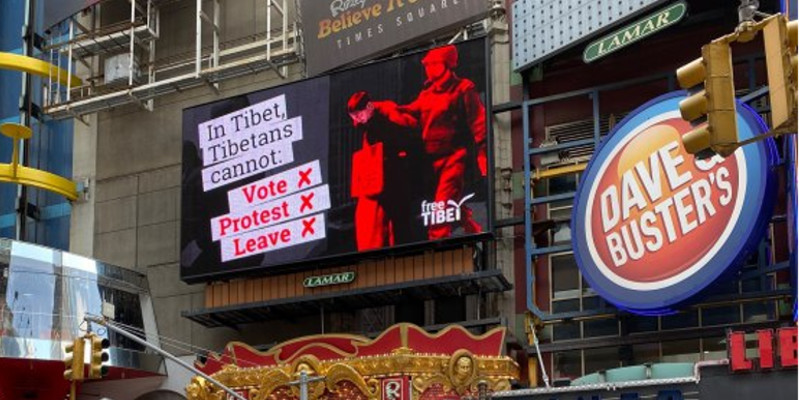China’s abuses in Tibet is being played on billboards of prominent squares of New York and London. A Tibet rights group has launched an advocacy campaign to highlight China’s human rights abuses in Tibet. The campaign aims to reach millions of eyes to raise increased awareness after being posted on prominent locations of the two cities.
The images have been organised by London-based NGO, Free Tibet and started running on billboards in both cities on Monday 24 August. They’re due to finish two weeks later on 6 September. The billboards are aimed at increasing public awareness of human rights abuses which are happening in Tibet. Millions of people are predicted to see the billboards in both locations during the two weeks they are set to run.
The image in Times Square is on 42nd street between 7th and 8th Avenue. It is based on a real photo of a Tibetan monk being taken away by Chinese security forces The accompanying text highlights how, in this election year, Tibetans in Tibet and living under Chinese occupation are not only unable to vote, but cannot protest or even leave Tibet.
A second advert in London, along the Kingston A3 Bypass shows a person draped in the Tibetan flag behind bars. It explains that Tibet has been in lock down since the Chinese invasion of the country in 1950.
“Beijing’s human rights record in Tibet is inexcusable and the west has been too silent for too long. This campaign breaks the silence and brings the Tibet issue back into the public domain where it belongs. We ask the public in New York’s Times Square, London and around the world to act now.” Free Tibet’s campaigns and advocacy manager, John Jones said.
Tibet was taken over and incorporated into China by force leading to its spiritual leader His Holiness the Dalai Lama and thousands of his followers fleeing into exile in India in 1959. Since then Chinese authorities maintain a tight grip on the region, restricting Tibetans’ political activities and peaceful expression of ethnic and religious identities, and subjecting Tibetans to persecution, torture, imprisonment, and extrajudicial killings.







Leave a Reply